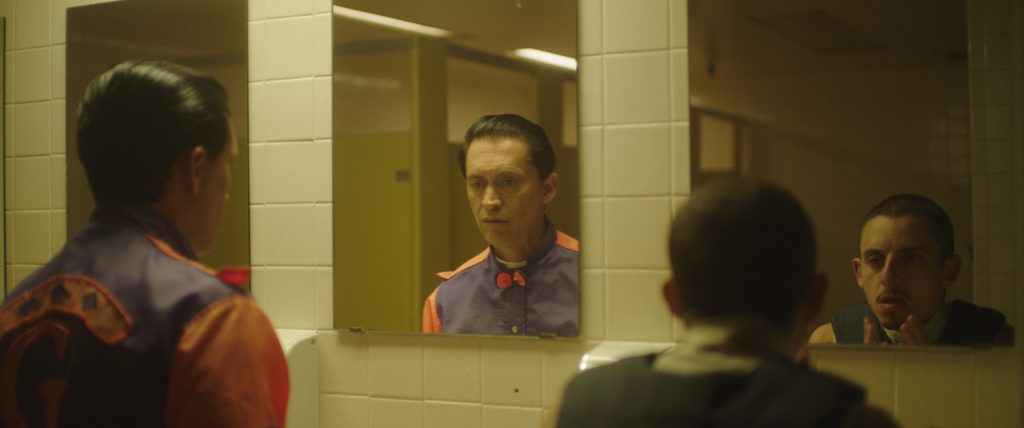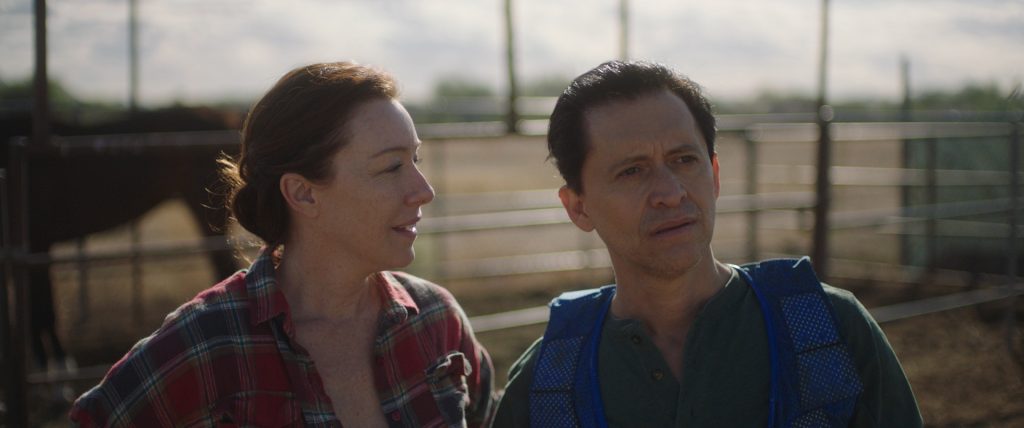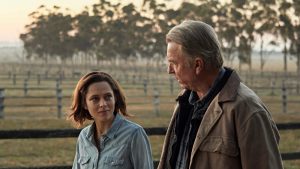January 6, 2022
by Carla Hay

Directed by Clint Bentley
Culture Representation: Taking place in Phoenix, the dramatic film “Jockey” features a predominantly white cast of characters (with a few Latinos) representing the working-class middle-class and wealthy.
Culture Clash: An aging horse racing jockey has to come to terms with his failing health and his fading career.
Culture Audience: “Jockey” will appeal primarily to people who are fans of star Clifton Collins Jr. and stories about getting older and the dark side of horse racing.

“Jockey” is a low-key but effective “slice of life” movie about a middle-aged horseracing jockey who has to face realities about his declining health and career. Clifton Collins Jr. anchors the film with a meaningful and authentic performance. People looking for a lot of horse racing in the movie might be disappointed that “Jockey” doesn’t have much of this type of action. “Jockey” is more of a human drama that examines something that most movies about jockeys almost never show: the health problems that often force a lot of jockeys to retire before they feel ready for retirement.
Directed by Clint Bentley, who co-wrote the movie’s screenplay with Greg Kwedar, “Jockey” had its world premiere at the 2021 Sundance Film Festival, where Collins won the U.S. Dramatic Special Jury Award for Best Actor. “Jockey” takes place and was filmed on location in Phoenix. There are quite a few striking scenes (cinematography by Adolpho Veloso) that happen at sunset, showing silhouettes and majestic skies. Whether it’s intentional or not, the sunset is a metaphor for the sunset of a career of a middle-aged jockey, who has made horse racing his entire life and is afraid of what his identity will be without horse racing.
Jackson Silva (played by Collins) is the protagonist/title character of “Jockey.” He’s a never-married bachelor who lives by himself and made horse racing his entire life. The movie’s opening scene is one of the sunset scenes, and it takes place at a horse racing track. Jackson and his longtime jockey friend Leo Brock (played by Logan Cormier), who are both in their 40s, are watching some younger jockeys practice on the track.
Jackson says to Leo: “I ain’t the same anymore, Leo. We’re both getting old.” Leo, who’s a bit of a sarcastic joker, replies, “But I’m like fine wine—I’m getting better.” Jackson can’t say the same thing. In fact, he knows his health is deteriorating, but he doesn’t really want to talk about it with anyone.
It’s not seen on camera, but Jackson has asked a veterinarian who treats horses to give Jackson an X-ray of his back. What is shown in the movie is the doctor discussing the X-ray results with Jackson. And the news isn’t good. When the doctor asks Jackson what kinds of injuries he’s had, Jackson tells him that he’s broken his back about three times. And those are just the injuries he’s willing to talk about to this doctor, who urges him to go to a medical doctor for humans as soon as possible.
Jackson has been working with the same trainer for years. Her name is Ruth Wilkes (played by Molly Parker), and she’s known Jackson since they were both in their 20s. Ruth senses that something isn’t quite right with Jackson. When she asks Jackson if he has any problems or concerns that he’d like to talk about, he denies that anything is wrong with him.
Meanwhile, one day Jackson is at a local diner and sees a 19-year-old aspiring professional jockey named Gabriel Boullait (played by Moises Arias), who has been asking around about Jackson and has recently started working as a stable boy for Jerry Meyer (played Daniel Adams), the owner of multiple race horses. Jackson joins Gabriel at his table and strikes up a conversation with him.
At first Jackson gives some friendly advice, such as telling Gabriel that he should focus on getting the right trainer before thinking about getting an agent. And then, Jackson starts asking Gabriel about where Gabriel grew up. Gabriel says that he’s originally from the South but he spend the last several years living in San Diego before moving to Phoenix. Jackson is curious to know why Gabriel has been asking about Jackson.
And that’s when Gabriel blurts out his mother Ana told Gabriel that he’s Jackson’s son. Jackson’s immediate reaction is a firm denial about being Gabriel’s father: “I don’t know what she told you, but that’s not possible. I’m not going to get in the particulars of it, but you and I are not related.” Jackson mumbles something about some wild times he had with Ana, but he implies that the timeline of their fling doesn’t match with when Gabriel would have been conceived.
Jackson then gets suspicious about Gabriel’s intentions and says that even though he’s a well-known jockey, he’s not rich and is actually barely surviving on his meager salary. “I’m not after your money,” Gabriel says defensively. Jackson replies, “Good, ’cause I’ve got nothing else to give you.”
Before Jackson ends the conversation and leaves the table, he tells Gabriel: “Don’t go around telling people you’re my kid. Makes me look like an asshole. You know what I don’t need? To look like an asshole.”
Around the same time that Jackson meets Gabriel, Ruth buys her first horse: a young racing mare named Dido’s Lament. Ruth is sure that the horse can be a champion with the right jockey. Ruth introduces Dido’s Lament to Jackson and lets him take the horse for a test run.
Jackson is flattered but he’s also realistic when he tells Ruth that he’ll understand if she chooses to have a younger jockey ride Dido’s Lament in any upcoming races. Ruth tells Jackson that she wants him to be the horse’s jockey. “We’ve come this far,” Ruth says. But she also hints to Jackson he needs to get in shape because he’s gained weight. “We’ve both gotten comfortable,” Ruth says as she pats his stomach and her stomach.
An elated and grateful Jackson immediately begins training to get physically fit for upcoming horse races. He tells Ruth that he’s “in it to win it.” The rest of “Jockey” shows what happens when Jackson gets this chance to extend his career. He also ends up mentoring Gabriel and becomes almost like a father figure to him.
However, Jackson can’t ignore his health problems. When he visits a doctor, he finds out exactly what’s wrong. How he handles it is a measure of his character and how much he wants to hold on to horse racing as part of his identity. As an example of how Jackson’s state of mind, not the horse racing, is the focus of the film, during Jackson’s horse racing scenes, there are only closeups of his face. (It’s also an easy way for this low-budget film to avoid staging any tricky horse races.)
Because of Jackson’s budding relationship with Gabriel, Jackson also has to face painful realities about what his life has become. It’s not that Jackson has regrets about not having children. It’s more about Jackson starting to understand that although he devoted to horse racing, he doesn’t have much to show for it, except some trophies, mementos, health problems, and a shaky financial future. He has friendships with other jockeys, but they talk mostly about work-related things.
Jackson sacrificed a lot of relationships along the way in his single-minded pursuit of his career, so now he’s alone when it comes to love. If he has any family members who are still alive, they’re not mentioned in the movie. In a candid conversation with Gabriel, Jackson shares some of his childhood memories, which explains why Jackson ended up making the choices he made in life. Jackson sees a lot of his younger self in Gabriel. And it makes Jackson feel proud, happy and scared.
Collins gives an understated but impactful performance as this lonely but defiant jockey. All of the other cast members (some who are real-life jockeys) give realistic performances too, but Collins’ portrayal of Jackson is the heart and soul of the movie because Jackson goes though the most mentally, physically and emotionally. Some viewers might think that “Jockey” is too slow-paced for a movie about a horse racing jockey. But if viewers have the patience to watch the entire film, it’s worth it just for the last scene, which is proof of why Collins gave an award-winning performance.
Sony Pictures Classics released “Jockey” in select U.S. cinemas on December 29, 2021. The movie is set for an expanded, nationwide theatrical release on February 11, 2022.


